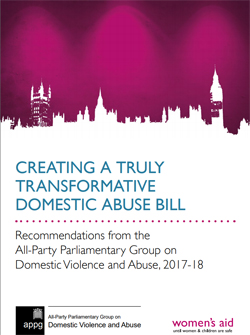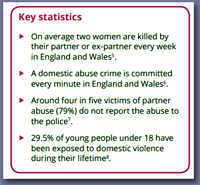 |
|
|
|
* In 2017/18, Rape Crisis services were used by 78,461 people, an increase of 17% on the previous year.
With an increase in sexual crimes, there is a continueing decrease in support services for the victims of rape and domestic abuse. There is nothing new in this. Nor is there anything new in Government's responding by calling for a a special study and report into the problems, rather than actually dealing with them. Moreover, the judiciary response to rape and domestic abuse is woeful, with inadequate sentencing, lack of empathy and support; and with accompanying cuts in support services for victims to take legal action against offenders. The report rate remains shameful as women faced being treated like criminals themselves and not victims and the media which trivialises rape and domestic violence in the way in which it reports cases. But, are thing about to change? That is the hope that comes from the latest report form the All-Party Parliamentary Group (APPG) on Sexual Violence, as it makes a series of recommendations and acknowledges the grim truth of the state of support services for victims. Specific support services for victims could cease to exist completely in many areas due to lack of funding and a surge in the number of victims that need help. Some centres had to close their waiting lists completely due to lack of funding, with closures continuing year by year. The report said: "The impacts on victims and survivors who have been subjected to sexual violence and abuse and then are unable to access specialist support cannot be overstated and must not be lost sight of." But t is very important to understand the following when reading this report, and not get carried away with the impact this report may have in terms of changing the current situation as Tory Government cuts continues to bite into local authority spending, to quote from the document: "This is not an official publication of the House of Commons or the House of Lords. It has not been approved by either House or its committees. All-Party Parliamentary Groups are informal groups of members of both houses with a common interest in particular issues. The views expressed in this report are those of the group." The All-Party Parliamentary Group on Domestic Violence and Abuse provides a forum for discussion on how policy and legislation relating to domestic violence and abuse is affecting survivors and specialist support services. Women’s Aid provides the secretariat to this group and supports the group in an administrative and operational capacity. The chair of the APPG is Jess Phillips MP, and the vice-chair is Maria Miller MP. Whilst all of the above is true, there is no doubting the influence this report could have, if received by a Government that takes the current appalling levels of sexual crime and domestic abuse seriously with a view to doing something about the current situation. In the Queen’s speech given in 2017, the government committed to deliver a domestic abuse bill, set to progress through parliament following the public consultation that opened on International Women’s Day 2018. The executive summary of the report says: "The APPG welcomes the proposed bill as a landmark opportunity to transform the national response to survivors of domestic abuse. The APPG is a valuable parliamentary mechanism for engagement with, and scrutiny of, the proposed legislation. The 2017-18 programme has been dedicated to discussion on key elements and priorities for the bill, which have enabled the group to make robust recommendations to government. The group hopes these recommendations will be considered carefully." Since then, and over the 2017-18 programme, the chair, vicechair, officers and secretariat of the APPG agreed to focus on the following key issues: * Transforming our national response: priorities for the upcoming domestic abuse bill * Establishing a new commissioner: a job description * Early intervention and prevention: tackling the root causes of domestic abuse * Protecting survivors with no recourse to public funds * Safe accommodation: tackling homelessness and the housing issues facing survivors – joint meeting with the APPG on Ending Homelessness of Complex needs: women’s mental health and domestic abuse – joint meeting with the APPG on Mental Health
The APPG on Domestic Violence and Abuse’s six key asks of the bill There are a multitude of issues facing survivors, many of which the APPG has covered before, including access to justice in the criminal courts, experiences of the family courts and child contact arrangements, effective police responses to the crime, the sentences handed down to perpetrators, and domestic homicide. The purpose of this report is to discuss key recommendations that have stemmed from this year’s programme of work which has focused on key areas identified by the group’s officers. On this basis, the APPG has the following six key asks for the bill: 1. A sustainable, long-term and secure funding model for specialist domestic abuse services, most urgently refuges, including those specific services for BME women, LGBT women and disabled women, and specialist support for children who have experienced domestic abuse. 2. A violence against women and girls (VAWG) commissioner, who has the power to effectively enforce a clear framework of national accountability for the resourcing, quality and provision of services. 3. Migrant survivors, including survivors on non-spousal visas and all those who have no recourse to public funds due to their immigration status, should have full and equal access to all the services and support they need. 4. ‘Priority need’ status for housing extends to all survivors of domestic abuse, with clear guidance that local authorities should accept all survivors of domestic abuse who present themselves as homeless, regardless of their local connection, under the local connection criteria of the homelessness legislation. 2 United Nations (UN) Declaration on the elimination of violence against women 1993. 5. Secure domestic abuse as a priority within the health and social care sector, first and foremost reflected through mandatory ongoing training for health care providers and professionals. 6. Ensure mandatory relationships and sex education has a clear and gendered focus on tackling domestic abuse and VAWG, tackles pervasive gender stereotypes, is delivered in partnership with the expertise of specialist domestic abuse services, has a ‘whole school approach’ to prevention, and includes both online and offline abuse. You can down load the full report by clicking on the cover pic above, or by going to the Unionsafety E-Library Database using the search word 'abuse' or using the search category 'Domestic Violence'. Source: Parliament UK See also: The Health, Safety And Welfare Of Women Already Hit By Brexit!
|


 The report does give formidable recommendations on how to tackle the problems:
The report does give formidable recommendations on how to tackle the problems: